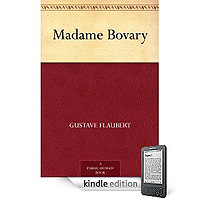 Welcome to Kindle free books. . .
Welcome to Kindle free books. . .Download this book FREE
This site offers a new Kindle ebook every day for FREE.
All the books in the right hand column can be downloaded to your Kindle or Kindle app software.
You can subscribe to the site on the right and get updated daily either by email or to your rss reader. You can also follow Kindle Free Books on Twitter
Description:
This book was converted from its physical edition to the digital format by a community of volunteers. You may find it for free on the web. Purchase of the Kindle edition includes wireless delivery.
 Madame Bovary (Gustave Flaubert)
Madame Bovary (Gustave Flaubert)Gustave Flaubert (Author)
customer reviews (Yes)
Kindle Price: £0.00 includes VAT & free wireless delivery
via Amazon Whispernet
Text-to-Speech: Enabled
Download this book FREE
Reviews from Amazon:
Flaubert's "Madame Bovary" scandalised French bourgeois society of the time with its shocking depiction of an adulteress, Emma Bovary, and her lascivious liaisons. The 19th-century press denounced both the book and its author as corrupting influences. History has exonerated Flaubert and exposed the hypocrisy of a society that would deny the existence of such women.
Emma Bovary, a young woman, newly married to a provincial doctor, is dazzled when she attends her first ball, attended by high aristocracy. With the culmination of her romantic ideals realised, her head is so filled with fanciful notions that she never re-enters reality, until the damning end:
Before her wedding day, she had thought she was in love; but since she lacked the happiness that should have come from that love, she must have been mistaken, she fancied. And Emma sought to find out exactly what was meant in real life by the words felicity, passion and rapture, which had seemed so fine on the pages of the books.
Frustrated and bored by her marriage, Emma embarks on a brief, rather touching affair with one young man but soon, vulnerable and exposed, she is fitting carrion for Monsieor Rodolphe, a serial womaniser. Soon, Emma has not only ruined her own reputation but destroyed that of her husband in her ruthless bid for wealth and recognition. The cast of characters, from passers-by to the shopkeepers who take her money, act like the chorus in a Greek tragedy. Seen through their eyes and their reactions to her, Emma's downfall is recounted but also society's intolerance.
On the surface, Flaubert provides a melodramatic morality tale. Slyly, underneath it all, he is laughing. Through his voyeuristic tale, with each salacious detail recounted, he is wilfully subversive as he points the finger not only at the guilty but at those who would dare to judge. --Nicola Perry
